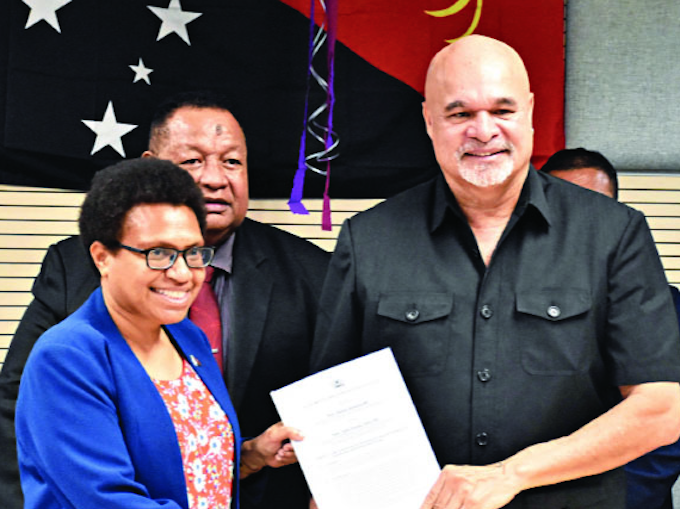
By Gorethy Kenneth in Port Moresby
More than 300 companies operating in Papua New Guinea are facing penalties and will be issued infringement notices for not adhering to the country’s labour laws, Deputy Prime Minister John Rosso has announced.
He said on Thursday that pending the official release of the full report of the National Capital District (NCD) Combined Labour Inspection Programme (CLIP), 431 companies were inspected and the findings were:
- about 18 companies were identified as paying 444 workers below the K3.50 (NZ$1.57) an hour minimum wage in the wholesale and retail industry, and
- 228 companies were not remitting Nasfund contributions affecting 2457 employees with about 20 of them non compliant.
Within 51 days, 431 companies or establishments were covered.
Out of the 431 companies, only 425 companies provided information of their total number of employees within their establishment, which comprised of the overall total of 13,410 employees covered.
Out of the 431 companies, only 421 companies provided their minimum wage information.
And out of the 421 responses, 403 responded to have their employees paid on and above K3.50 the national minimum wage, while only 18 companies paid below the national minimum wage of K3.50, which in total affects 444 employees.
Industries varied
“For companies that have been issued infringement notices of non-compliance and charged under OSH and OWC, we are yet to receive the amount charged, and also to confirm which companies have paid and those that are yet to pay or remit respectively,” Rosso said.
The number of industries varied, but a high number of wholesale and retail industries totaling to 249 companies under this industry were covered to confirm that “we have a high number of this industry that operates within the nation’s capital city”.
Others included trade, hotels and restaurants (27), transport, storage and communication (9), manufacturing (15), primary production (3), building and construction (11) and security (6).
The inspections in NCD in the last two months also collected statutory fees from occupational, safety and health regulations, and workers compensation insurance policy payments.
Rosso released this during the handover takeover ceremony of the Labour Ministry to Rai Coast MP Kessy Sawang on Thursday.
“All of these offending companies were issued notices to comply with the Department of Labour and Industrial Relations requirements, and other government statutory requirements such as the Bank of Papua New Guinea regulations on Nasfund contributions,” he said.
“This proves a point I have made many a time, that the department has the potential to generate revenue in the non-tax regime, provided sufficient recurrent funding is made available in the DLIR annual allocations,” Rosso said.
Strengthening laws
He said that in his capacity as the Deputy Prime Minister, he would work with Minister Sawang to ensure DLIR was adequately supported to continue this exercise and others.
“Strengthening to the existing legislature and fees and fines are also areas I focused on, and Minister Sawang is tasked with carrying on this activity and similar, like, freeing up 10,000 jobs presently held by foreign workers through up-skilling of local talent.
Other notable achievements during his time with the department include the launching of the National Training Policy 2022 to 2023 and the Labour Market Information Policy 2022-2023, and the ratification of three important International Labour Organisation (ILO) Conventions which were the Violence and Harassment Convention 2019 (No. 190), the Tripartite Consultation Convention 1976 (No. 144), and the Labour Inspection Convention 1974 (No. 81).
Rosso congratulated Sawang on her appointment as minister, and said he looked forward to her leadership of the Department of Labour and Industrial Relations for a smart, secure, fair and decent work environment for PNG.
Gorethy Kenneth is a senior PNG Post-Courier reporter. Republished with permission.












































